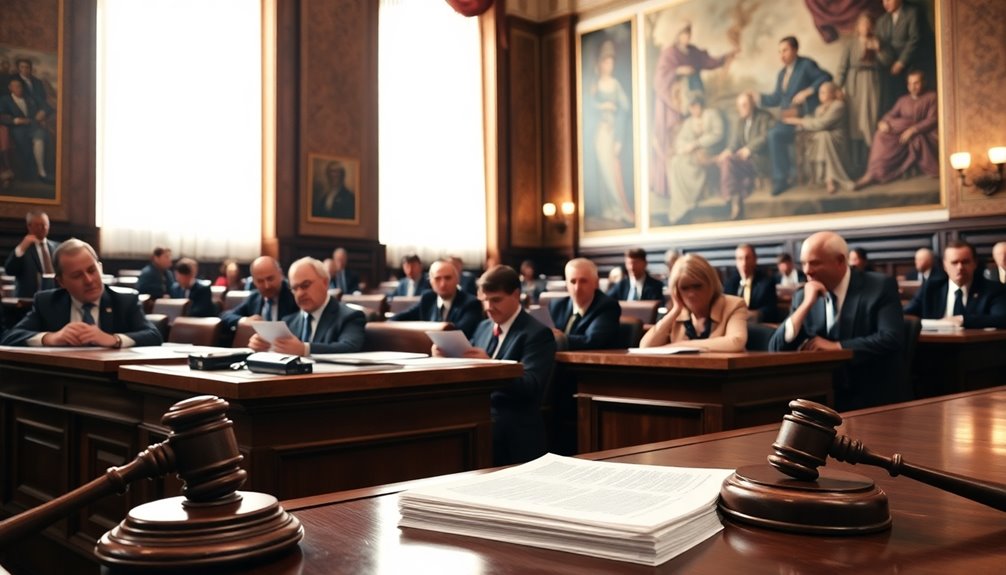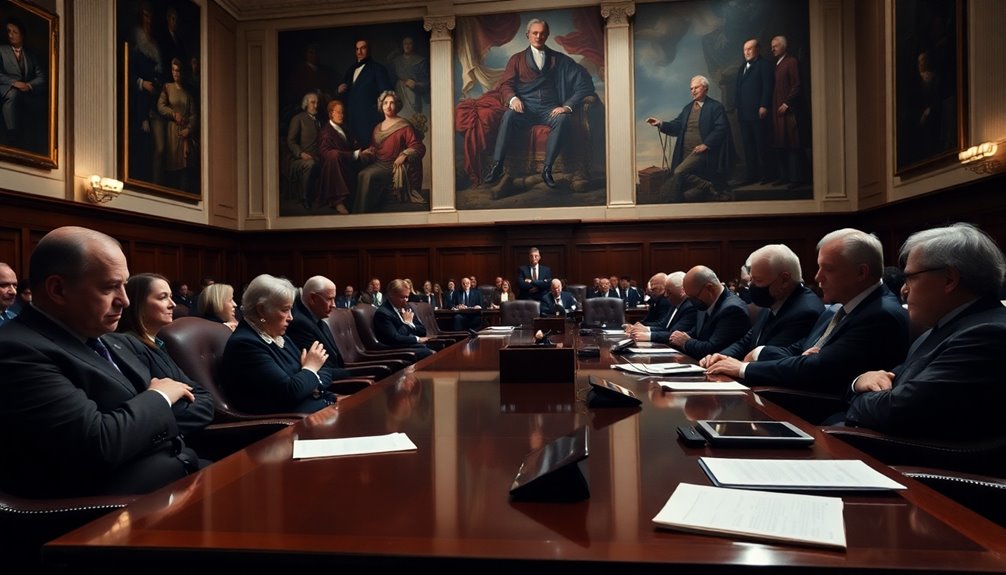The Senate's vote on Robert F. Kennedy Jr.'s nomination showcased a sharp party division, with 52 supporting and 48 opposing. Republicans mainly backed him, influenced by President Trump and Vice President Vance, while Democrats united against him over concerns about his vaccine views and lack of health administration experience. Personal incidents, like Mitch McConnell's polio experience, influenced some votes too. If you're curious about each senator's reasoning, you'll find more details on their decisions ahead.
Key Takeaways
- The Senate confirmed Robert F. Kennedy Jr. with a narrow 52-48 vote, highlighting a clear party-line division.
- All Democratic senators opposed Kennedy, primarily due to his controversial views on vaccine safety.
- Republicans largely supported Kennedy, with some swing votes being crucial for his confirmation.
- Mitch McConnell voted against Kennedy, citing personal experiences with polio influencing his decision.
- Kennedy's lack of health administration experience and ethical concerns about financial interests were significant factors in the debate.

How did the Senate arrive at a narrow 52-48 vote to confirm Robert F. Kennedy Jr.? The decision reflected a clear party-line split, with most Republicans backing Kennedy while Democrats vehemently opposed him. Notably, Sen. Mitch McConnell broke ranks, voting against Kennedy, citing his personal experience with polio. This exception highlighted the deep concerns many senators had regarding Kennedy's controversial views.
Democratic opposition stemmed largely from Kennedy's past comments on vaccine safety and potential conflicts of interest. Each Democratic senator cast their vote against him, fearing that his leadership could undermine public trust in vaccines and disrupt vital health initiatives. With a close margin of 52 to 48, every vote mattered, making the contributions of swing Republicans like Bill Cassidy and Susan Collins crucial for Kennedy's confirmation.
In the lead-up to the vote, significant issues dominated the debate. Senators scrutinized Kennedy's past statements on vaccine safety and his lack of experience in health administration. Critics pointed out that Kennedy's background as an environmental lawyer didn't align with the responsibilities of the Secretary of Health and Human Services. This raised ethical questions about his financial interests in vaccine litigation, further complicating his nomination.
The Senate floor became a battleground for 30 hours, as Democrats passionately opposed Kennedy's confirmation. During intense committee hearings, Kennedy faced tough questioning, where he attempted to clarify his views on vaccines. Although he shifted his stance, supporting some vaccines while remaining skeptical about others, doubts lingered.
Support from President Trump and Vice President JD Vance played a pivotal role in rallying Republican support. Following the confirmation, Kennedy was expected to be sworn in quickly, with plans for an executive order aimed at public health initiatives.
Yet, he now faces the daunting challenge of rebuilding trust in public health institutions while navigating a landscape rife with skepticism and legal hurdles.
Frequently Asked Questions
What Are Robert F. Kennedy Jr.'S Main Political Positions?
Robert F. Kennedy Jr. holds strong views on several political issues. He champions a single-payer healthcare system while opposing Biden's climate initiatives and nuclear power.
You’ll find he supports debt forgiveness and aims to reform the energy market for cleaner practices. He believes that debt forgiveness can help alleviate financial burdens on families and stimulate economic growth. Additionally, he proposes initiatives to maximize ceiling fan efficiency, ensuring that energy consumption is reduced while still maintaining comfort in homes. By implementing these reforms, he hopes to create a more sustainable future that benefits both individuals and the environment.
In foreign policy, he advocates reducing military presence and negotiating peace with China.
How Has Public Opinion Influenced Senators' Decisions?
You know what they say: "You can't please everyone."
Public opinion significantly influences senators' decisions, especially when constituents express strong feelings. In states with partisan divides, senators often align their choices with the prevailing views of their voters.
If a majority supports or opposes a figure, senators might feel pressured to follow suit, balancing their party loyalty with the need to maintain public confidence in their leadership and the institutions they represent.
What Is the Process for Nominating Candidates?
When the President nominates a candidate, you'll see a structured process unfold.
First, the President consults with Senators before announcing the nomination.
Then, the nominee undergoes background checks and prepares for Senate hearings.
During the hearings, they testify and answer questions.
The committee votes on the nomination, and if favorable, it moves to the full Senate for debate and a final vote.
If confirmed, the nominee assumes their new role.
Are There Any Notable Endorsements for RFK Jr.?
In the political arena, endorsements can be like gold dust, shining a light on a candidate's viability.
For RFK Jr., notable endorsements include President Trump, who supports him in the 2024 presidential race.
Additionally, Republican senators like Bill Cassidy and Susan Collins have voiced their backing, despite initial hesitations.
Roger Marshall's enthusiasm for RFK Jr. leading Health and Human Services further illustrates a growing wave of Republican support around his nomination.
How Does the Nomination Impact Upcoming Elections?
The nomination impacts upcoming elections by shifting voter sentiment and party dynamics.
You'll see some voters drawn to third-party candidates like Robert F. Kennedy Jr., who can disrupt traditional voting patterns.
If Kennedy gains traction, it could siphon votes from major-party candidates, particularly in swing states.
This situation might force the major parties to rethink their strategies and appeal more directly to voters' concerns about health and policy, influencing the overall electoral landscape.
Conclusion
As the final votes are cast, the weight of history hangs in the air like a thick fog. Each senator's decision on Robert F. Kennedy Jr.'s nomination reflects not just political lines, but the hopes and dreams of countless Americans. This moment is more than a simple vote; it's a crossroads that will shape the future. As you reflect on their choices, remember: the echoes of today's decisions will resonate through time, guiding the path ahead.









